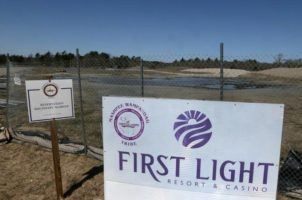AEI Bashes New York Casino Plan, Calls It ‘Loser City’ Move
Posted on: November 17, 2022, 01:23h.
Last updated on: November 17, 2022, 01:44h.
Howard Husock, a senior fellow with the right-leaning American Enterprise Institute (AEI), has excoriated plans to bring a casino to New York’s Times Square, He notes that cities with downtown gaming venues have something in common, and it’s not good.

Cleveland, Cincinnati, Detroit, St. Louis, New Orleans, and Philadelphia are among the metropolitan areas not often associated with gaming, but are all home to downtown casinos. Chicago appears to be ready to join that fray.
Notice what they have in common: These are loser cities,” wrote Husock. “They are among the top 20 most crime-ridden cities (New York is still not on that list). They have consistently lost population for decades. They have lost major industries and failed to generate new ones. Immigrants have avoided them.”
The Times Square casino plan is being pitched by real estate investment trust (REIT) SL Green and Caesars Entertainment, with those companies claiming a gaming venue on Broadway could speed New York City’s economic recovery from the coronavirus pandemic.
Times Square Casino Could Be Waving White Flag
As Husock notes, many of the aforementioned cities were heavily dependent on a single industry, and when the related business faltered, the metro areas were often too slow to react, forcing them to embrace casinos under the auspices of job creation and tax revenue.
“A Gotham welcome to casino gambling would be like waving a white flag in the struggle to reinvigorate the city’s economy,” he added. “Cities which have succumbed to the casino temptation are places that were over-invested in single industries (car manufacturing in Detroit, beer in St. Louis, textiles in Philadelphia) and watched their fortunes decline when they failed to replace what they lost.”
The AEI senior fellow points out that local politicians often warm to gaming expansion because operators sell them on added jobs and boosted government receipts. However, that tax factor may be just a bill of goods.
“Despite tax revenues being a major motivator for state legalization of casinos, there is little evidence that they boost state taxes,” according to a July report by the Richmond branch of the Federal Reserve.
Follow Thriving Cities’ Lead
In New York’s recent gubernatorial race, Democrat Kathy Hochul narrowly defeated Republican Lee Zeldin. The Democrat is supportive of a third downstate casino. While Zeldin didn’t campaign by opposing that idea, he touted a broader, less vice-heavy economic recovery plan.
The list of cities that don’t permit casinos is the list that New York should want to be on,” concluded Husock. “Texas bans casino gambling — yet Houston, Dallas, San Antonio, and Austin are booming. Boston will permit a race-track casino — but not a downtown establishment. Nor will there be one in Cambridge — where biotech has thrived in districts once known for candy-making.”
There is some interest in bringing gaming venues to Texas, and Wynn’s Encore Boston Harbor is located not far from the city center, but far enough away to not be considered downtown.
Related News Articles
Millennials, Gen Z Comprise Majority of Sports Bettors, According to Study
Sands Taps Community College as Long Island Training Hub
Caesars Expands Rewards Program in Quest for Times Square Casino
Caesars Won’t Empty War Chest in New York, Unlikely to Sell Assets in 2023
Most Popular
Jackpot News Roundup: Two Major Holiday Wins at California’s Sky River Casino
PUCK, NO! Health Dept. Closes Las Vegas Wolfgang Puck Restaurant
Oakland A’s Prez Resigns, Raising Questions About Las Vegas Move
MGM Osaka to Begin Construction on Main Resort Structure in April 2025
Most Commented
-
UPDATE: Whiskey Pete’s Casino Near Las Vegas Closes
— December 20, 2024 — 33 Comments -
Zillow: Town Outside Las Vegas Named the Most Popular Retirement City in 2024
— December 26, 2024 — 31 Comments -
Oakland A’s Prez Resigns, Raising Questions About Las Vegas Move
— December 27, 2024 — 9 Comments -
Caesars Virginia in Danville Now Accepting Hotel Room Reservations
— November 27, 2024 — 9 Comments
















No comments yet